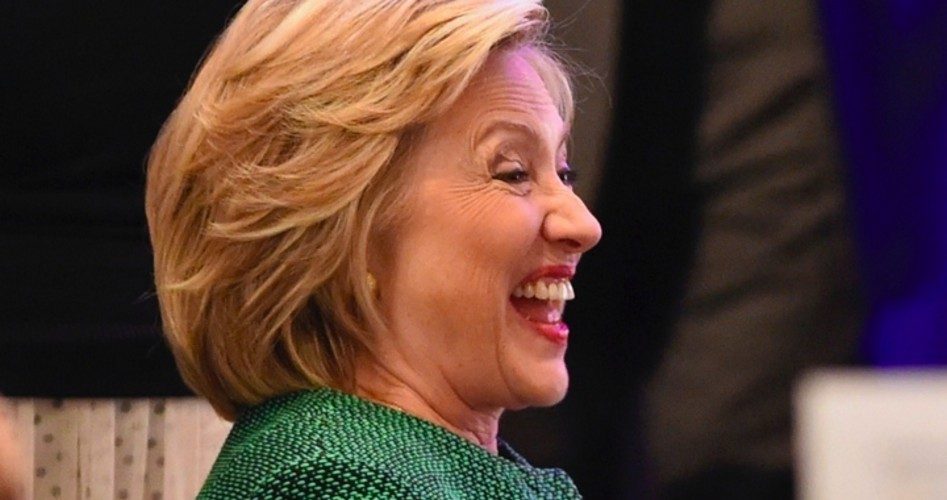
The saga of Hillary Clinton’s private e-mail server continues to twist and turn. Less than two weeks before congressional hearings in which Clinton herself will be testifying before House investigators, President Obama weighed in, stating dismissively on 60 Minutes, “I don’t think it posed a national security problem…. This is not a situation in which America’s national security was endangered.” While the president allowed that Clinton’s use of the server was a mistake, he played down the potential seriousness of her actions.
The president’s comments have not sat well with the FBI, some of whom now believe that the president has made up his mind on the matter and will likely instruct the Department of Justice to dismiss the entire affair no matter what the Bureau’s findings and recommendations. As Ron Hosko, a former senior FBI official, told the New York Times, “Injecting politics into what is supposed to be a fact-finding inquiry leaves a foul taste in the F.B.I.’s mouth and makes them fear that no matter what they find, the Justice Department will take the president’s signal and not bring a case.”
Despite such sentiments, the White House has doubled down on the president’s comments, with White House Press Secretary Josh Earnest telling the Times, “There’s a debate among national security experts, as part of their ongoing, independent review, about how or even whether to classify sections of those emails. But, as the president said, there is no evidence to indicate that the information in those emails endangered our national security.”
Such comments, which suggest the White House has already made up its mind, have drawn comparisons with the 2012 investigation of former CIA Director David Petraeus. Petraeus, a four-star general, was accused of sharing classified information with his mistress and biographer, charges that turned out to be true. Yet in a 2012 news conference, with the FBI investigation ongoing, President Obama came to his defense, insisting, “I have no evidence at this point, from what I’ve seen, that classified information was disclosed that in any way would have had a negative impact on our national security.”
As it turned out, Petraeus had disclosed the names of covert officials and other classified information to his biographer, but also lied to investigators about it. The FBI recommended that felony charges be brought against Petraeus and recommended a prison sentence.
But Obama’s then-attorney general, Eric Holder, ignored the FBI’s findings. Petraeus was eventually charged with a misdemeanor, avoided jail time, and continues to serve the Obama administration in an advisory capacity.
Small wonder that FBI officials are now concerned that Hillary Clinton, regardless of the severity of her own security breaches and prevarications, will enjoy similar immunity. There can be little doubt that Democratic Party insiders, including presumably the Obama administration, do not intend for anything to stand in the way of her coronation as the Democratic presidential nominee and eventual president of the United States. And, as the case of David Petraeus vividly illustrates, the power elite usually take care of their own.
Meanwhile, what can we expect from next week’s hearings on the Benghazi scandal? Does the Benghazi affair, along with the ongoing investigation of Clinton’s private e-mail server, truly have the potential to bring down Clinton and finally put an end to her decades-old presidential aspirations, as some pundits, such as Fox News analyst Judge Napolitano, have confidently asserted?
That will most likely depend upon whether the political establishment that supports Hillary Clinton comes to view her as a liability. As the Petraeus affair (not to mention the numerous scandals associated with the Clintons back in the ’90s, including the impeachment off Bill Clinton) has shown, the power elites are able to make almost any crime or scandal go away if they conclude it is in their best interests to protect an asset.
In the case of the Clinton administration, Bill Clinton was probably protected even during impeachment for perjury and various other crimes because the power elites did not want to destroy the long-term political prospects for Hillary — prospects that are finally nearing fruition. Accordingly, all the high crimes, misdemeanors, and suspicious goings on associated with the Clinton administration — the selling of military secrets to the Chinese in exchange for campaign contributions, the use of Arkansas state troopers as pimps for the libidinous Bill Clinton, the numerous allegations of adultery and serial sexual misconduct (including harassment) of women, the Whitewater scandal, the lying under oath, the numerous mysterious deaths of Clinton associates — have all been airbrushed out of the public record. Most younger voters, who have no personal recollection of the Clinton years, have no idea of how scandal-ridden, venal, and even criminal the Clintons were.
But should the mounting burden of new Clinton scandals prove too much, the political establishment has Joe Biden waiting in the wings. Biden is likely awaiting a signal from the political elites that he would enjoy their support instead of Hillary before making an announcement. In this connection, it is probably not coincidental that Biden has made no move prior to next week’s hearings. Should Clinton tank at the hearings, or the FBI recommend indictment over Clinton’s breaches of e-mail security, Biden will doubtless get the green light.
In the meantime, Americans are left to wonder whether, after more than two decades of scandal, the political establishment will ever tire of supporting Hillary Rodham Clinton.
Photo of Hillary Clinton: AP Images



